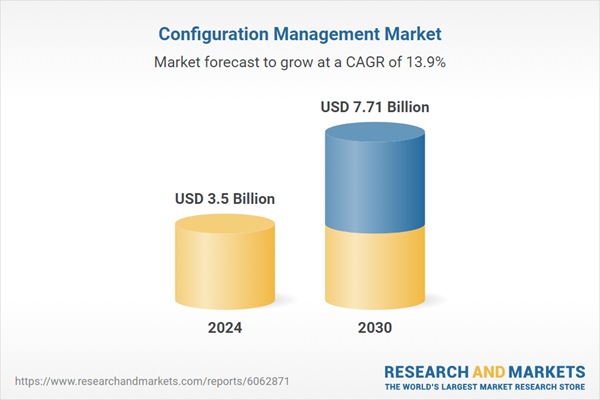Speak directly to the analyst to clarify any post sales queries you may have.
10% Free customizationThis report comes with 10% free customization, enabling you to add data that meets your specific business needs.
Configuration management, a foundational aspect of IT service management, is essential for maintaining control and consistency across an organization's IT assets and configurations. As enterprises advance their digital transformation initiatives and deploy increasingly intricate IT infrastructures, the requirement for comprehensive configuration management becomes critical. These solutions enable organizations to optimize operations, reduce downtime, and improve system reliability by automating configuration processes and systematically managing changes.
The market is further propelled by the widespread adoption of cloud computing, virtualization, and hybrid IT ecosystems, which necessitate adaptable configuration management tools capable of integrating across diverse technology environments. Additionally, increasing regulatory pressures and heightened focus on security and governance are influencing organizations to adopt structured configuration management practices.
Key Market Drivers
Growing Complexity of IT Infrastructure
One of the primary factors fueling market growth is the escalating complexity of IT ecosystems. Organizations are adopting advanced technologies such as cloud services, virtualization, and hybrid infrastructure models. These developments introduce significant challenges in terms of system visibility, control, and compliance.Configuration management solutions address these challenges by enabling real-time tracking, automation, and standardized control of configurations across diverse and dynamic environments. This not only ensures compliance with internal and external standards but also mitigates the risk of misconfigurations, which can result in costly system failures or security breaches. As enterprise IT environments expand and become more interconnected, the need for advanced configuration tools becomes increasingly vital.
As an example, global data centers consumed an estimated 240-340 terawatt-hours (TWh) of electricity in 2022 - representing approximately 1-1.3% of total global electricity demand. This level of energy consumption reflects the complexity and scale of today’s IT operations, further highlighting the necessity of effective configuration management.
Key Market Challenges
Integration with Legacy Systems
A significant challenge for the configuration management market is the integration of new solutions with legacy IT systems. Many organizations continue to rely on outdated infrastructure that lacks the interoperability and flexibility required to support modern configuration tools.These legacy environments often hinder visibility and consistency, leading to inefficiencies and gaps in configuration management processes. Overcoming these obstacles requires solutions that offer strong backward compatibility or the use of middleware to bridge integration gaps. Additionally, businesses must adopt strategic modernization plans that balance the need for innovation with operational continuity. The complexity of such integrations can slow the pace of adoption and limit the overall effectiveness of configuration management initiatives.
Key Market Trends
Rising Adoption of Cloud-Based Configuration Management
Cloud-based configuration management solutions are gaining substantial traction. As organizations increasingly migrate workloads to the cloud, there is a growing need for tools that offer scalability, flexibility, and accessibility across multiple cloud platforms.Cloud-based tools deliver numerous benefits, including lower infrastructure costs, real-time updates, and seamless integration with other cloud-native services like CI/CD pipelines. These solutions support dynamic and fast-paced IT environments, offering the agility required to maintain robust configuration control in real time. The growing reliance on hybrid and multi-cloud strategies is expected to continue driving demand for configuration management solutions that provide centralized governance and streamlined oversight.
Key Market Players
- IBM Corporation
- Microsoft Corporation
- BMC Software, Inc.
- ServiceNow, Inc.
- Broadcom Inc.
- Cisco Systems, Inc.
- Hewlett Packard Enterprise Development LP
- Red Hat, Inc.
- VMware, Inc.
- Oracle Corporation
- Atlassian, Inc.
- Juniper Networks, Inc.
Report Scope:
In this report, the Global Configuration Management Market has been segmented into the following categories, in addition to the industry trends which have also been detailed below:Configuration Management Market, By Component:
- Solution
- Service-Managed
- Professional
Configuration Management Market, By Vertical:
- BFSI
- Retail & Consumer Goods
- Transportation
- Energy & Utility
- Healthcare
- Manufacturing
- Other
Configuration Management Market, By Region:
- North America
- United States
- Canada
- Mexico
- Europe
- France
- United Kingdom
- Italy
- Germany
- Spain
- Belgium
- Asia-Pacific
- China
- India
- Japan
- Australia
- South Korea
- Indonesia
- Vietnam
- South America
- Brazil
- Argentina
- Colombia
- Chile
- Peru
- Middle East & Africa
- South Africa
- Saudi Arabia
- UAE
- Turkey
- Israel
Competitive Landscape
Company Profiles: Detailed analysis of the major companies present in the Global Configuration Management Market.Available Customizations:
With the given market data, the publisher offers customizations according to a company's specific needs. The following customization options are available for the report.Company Information
- Detailed analysis and profiling of additional market players (up to five).
This product will be delivered within 1-3 business days.
Table of Contents
Companies Mentioned
- IBM Corporation
- Microsoft Corporation
- BMC Software, Inc.
- ServiceNow, Inc.
- Broadcom Inc.
- Cisco Systems, Inc.
- Hewlett Packard Enterprise Development LP
- Red Hat, Inc.
- VMware, Inc.
- Oracle Corporation
- Atlassian, Inc.
- Juniper Networks, Inc.
Table Information
| Report Attribute | Details |
|---|---|
| No. of Pages | 181 |
| Published | April 2025 |
| Forecast Period | 2024 - 2030 |
| Estimated Market Value ( USD | $ 3.5 Billion |
| Forecasted Market Value ( USD | $ 7.71 Billion |
| Compound Annual Growth Rate | 13.9% |
| Regions Covered | Global |
| No. of Companies Mentioned | 12 |









